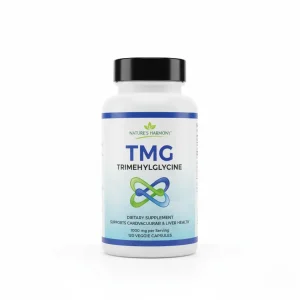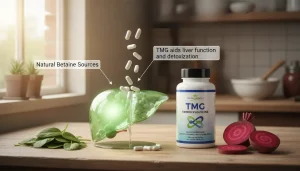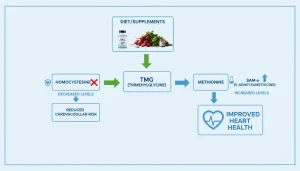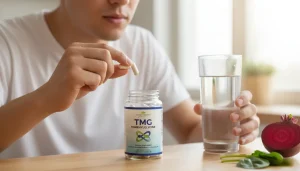You may have come across TMG (Trimethylglycine) supplements during your wellness shopping or heard people mention it. But if you’re anything like most, you probably thought, “TMG? Is that a media company?” Or, maybe you thought, “Isn’t that the name of an ’80s hip-hop group?” Well, it’s neither of those things, but it’s definitely something worth understanding, especially considering how beneficial it can be for your health.
TMG supplements are a hidden gem in the world of dietary supplements, offering a host of benefits for heart, liver, brain, and overall body health. Want to know how it works and why it’s so effective? Let’s dive in!
What Are TMG Supplements (Trimethylglycine)
TMG, also known as trimethylglycine, is a naturally occurring compound found in certain foods and produced by your body.

It plays a vital role in the body’s process of converting homocysteine into other beneficial substances. Homocysteine is an amino acid that, when imbalanced, can contribute to cardiovascular issues and affect cognitive function.
Let’s simplify the term a bit:
- Trimethyl: Refers to three methyl groups (methyl groups are small molecules made of one carbon and three hydrogens).
- Glycine: This is an amino acid.
Combined, TMG is a nutrient that works behind the scenes in the body to support a range of essential functions, from liver detoxification to supporting heart health and mental clarity.
It may also be referred to as “betaine,” though this is just a different name for the same compound. While the term “betaine” can sometimes refer to other forms of the nutrient, when it’s found in grains or supplements, it’s the same TMG you need to support various aspects of your health.
Quick Takeaways: What You’ll Learn About TMG Supplements
If you’re considering adding TMG supplements to your routine, you’ll find that they offer a lot more than just heart benefits. Here’s a detailed look at what you can expect to learn in this article:
1. What TMG Actually Is and How It Works in the Body
TMG is a vital nutrient that supports various bodily functions. You’ll learn how it works to balance homocysteine levels, promote methylation, and keep your cells functioning properly. You’ll also discover how it contributes to antioxidant protection, helping your cells remain healthy and resilient against damage.
2. Top Health Benefits of TMG Supplements
- Heart Health: One of the key benefits of TMG is its ability to maintain healthy homocysteine levels, lowering the risk of heart disease and improving circulation.
- Liver Health: TMG supports liver function, which helps your body detoxify and maintain a healthy metabolism.
- Cognitive Function: TMG has been shown to improve mental clarity, supporting cognitive function and even elevating mood.
- Metabolism and Inflammation: TMG also helps regulate metabolism and supports a healthy inflammatory response, which is key to overall well-being.
3. Who Should Take TMG and Who Should Be Cautious
TMG is an excellent supplement for individuals with elevated homocysteine levels, those interested in heart health, and athletes. However, people who are pregnant, breastfeeding, or taking certain medications should consult a doctor before starting TMG.
4. How to Choose the Best TMG Supplement
Choosing the right supplement is important. This section will guide you on selecting a high-quality product based on dosage, form, and brand reputation.
5. Where to Get TMG Naturally and Why Supplements Might Be the Best Option
You’ll learn about the natural food sources of TMG, like beets and spinach, and why supplements are often the most reliable way to get a therapeutic dose of this vital nutrient.
How Does TMG Work in Your Body?
Now that you understand what TMG is, let’s talk about how it works in your body and why it’s so effective.
- Cell Health: TMG is an osmolyte, which means it helps your cells maintain proper hydration and fluid balance. Think of it like a balance keeper for your cells, ensuring they don’t become too swollen or shriveled.
- Methyl Donor: The methyl groups in TMG are essential for methylation, a process that affects gene expression and homocysteine metabolism. By donating these methyl groups, TMG helps balance homocysteine levels, which can reduce the risk of heart disease.
- Antioxidant Protection: TMG also acts as an antioxidant, protecting cells from oxidative stress. This makes it essential for reducing cellular damage and supporting long-term health.
Health Benefits of TMG Supplements
TMG supplements have a wide range of benefits. Here are the top ways they can support your health:
1. Supports Heart Health
High levels of homocysteine in the blood can increase the risk of cardiovascular problems, including heart disease and stroke. TMG helps lower homocysteine levels, reducing the risk of plaque buildup in the arteries. A healthy cardiovascular system relies on balanced homocysteine levels, and TMG plays a pivotal role in maintaining that balance.
2. Boosts Liver Function

x center, filtering out toxins and waste. TMG supports liver function, helping the organ process and eliminate toxins more efficiently. A healthy liver is critical for optimal metabolic function and general well-being.
3. Enhances Mental Clarity and Cognitive Function

TMG is known to boost mental clarity, helping to improve focus and cognition. It’s especially useful for older adults or anyone experiencing brain fog. By promoting the proper metabolism of homocysteine and supporting methylation, TMG helps maintain cognitive function, improving mood and mental sharpness.
4. Aids Metabolism
Metabolism involves a wide array of processes, from breaking down nutrients to managing energy. TMG supports metabolism, helping the body process food and nutrients more efficiently. A healthy metabolism can also support better weight management and energy levels.
5. Supports a Healthy Inflammatory Response
TMG helps maintain healthy levels of inflammatory markers in the body. Chronic inflammation is linked to many health problems, including heart disease, arthritis, and even cognitive decline. By promoting a healthy inflammatory response, TMG can help mitigate these risks and promote overall health.
Is “Betaine” the Same as TMG?
Yes, betaine and TMG are essentially the same compound. The term “betaine” is often used interchangeably with TMG. It’s important not to confuse this with other forms of betaine, which may have slightly different chemical structures. However, in food and supplement form, betaine and TMG provide the same benefits. So, whether you come across TMG or betaine, rest assured you’re getting the same heart-healthy compound.
Who Should Take TMG Supplements?
TMG can be a game-changer for many people. Here’s a list of those who might benefit most from TMG supplements:
- Individuals with Elevated Homocysteine Levels: If you’ve had blood tests showing that your homocysteine levels are too high, TMG can help lower them and reduce your risk of heart disease.
- People Seeking Heart Health Support: If you’re looking to keep your heart in top condition, TMG’s ability to balance homocysteine can make a big difference.
- Athletes and Fitness Enthusiasts: TMG can aid in muscle recovery and support a well-functioning metabolism, making it a great supplement for active individuals.
- Older Adults: Aging can slow down certain metabolic and cognitive processes. TMG can help keep things running smoothly, supporting cognitive function and energy levels.
That said, if you’re pregnant, breastfeeding, or on medications that affect homocysteine levels (such as blood thinners), it’s always a good idea to check with your doctor before starting any new supplement.
How to Choose the Best TMG Supplement
Choosing the right TMG supplement can be tricky with so many options available. Here are a few tips to help you make an informed decision:
- Dosage: Most people take between 500 mg and 2,000 mg of TMG per day. Start with a lower dose and gradually increase as needed.
- Purity: Look for products with minimal fillers or artificial ingredients. The cleaner the supplement, the better.
- Form: TMG is available in several forms, including capsules, powders, and liquids. If you prefer convenience, capsules are a great option. If you want more flexibility with dosage, powders or liquids may be a better choice.
- Brand Reputation: Always choose supplements from reputable brands that are known for their quality. Look for third-party testing and customer reviews to ensure you’re getting a high-quality product.
Where to Get TMG Naturally
While it’s challenging to get a therapeutic dose of TMG from food alone, certain foods do contain small amounts of it. The best natural sources of TMG include:
- Beets: Beets are one of the top sources of TMG.

- Spinach: Another leafy green that’s rich in TMG.
- Whole Grains: Rye, oats, and quinoa are good sources.
- Animal Products: Some meats, such as fish and liver, contain TMG as well.
However, to get an effective dose of TMG, supplements are often the easiest and most reliable way to meet your body’s needs.
How to Take TMG Supplements

Taking TMG is easy! You can take it with or without meals. If you’re using capsules, start with one 500 mg capsule per day. If you opt for powdered TMG, mix it with water, juice, or a smoothie. You can increase the dosage over time, depending on your needs and how your body responds.
Conclusion: Is TMG Right for You?
TMG is an incredibly versatile nutrient that can help support heart health, liver function, cognitive clarity, and overall well-being. Whether you’re looking to reduce inflammation, improve metabolism, or just support your long-term health, TMG supplements can make a difference.
If you think TMG could benefit you, talk to your healthcare provider to find the best supplement for your needs. It’s time to give your heart, liver, and brain the support they deserve!
What are TMG supplements used for?
TMG supplements are mainly used to support heart health, liver detoxification, brain function, and methylation processes in the body. They help balance homocysteine levels, which can reduce cardiovascular risk.
Are TMG supplements the same as betaine?
Yes. TMG is another name for betaine. Both refer to the same compound—Trimethylglycine—which occurs naturally in foods like beets and spinach and is also available in supplement form.
How much TMG should I take per day?
A typical daily TMG supplement dosage ranges from 500 mg to 2,000 mg, depending on your health goals. It’s best to start low and increase gradually, or follow a doctor’s recommendation.
When is the best time to take TMG supplements?
TMG can be taken with or without food, usually once or twice daily. Many prefer taking it in the morning to support energy and methylation throughout the day.
